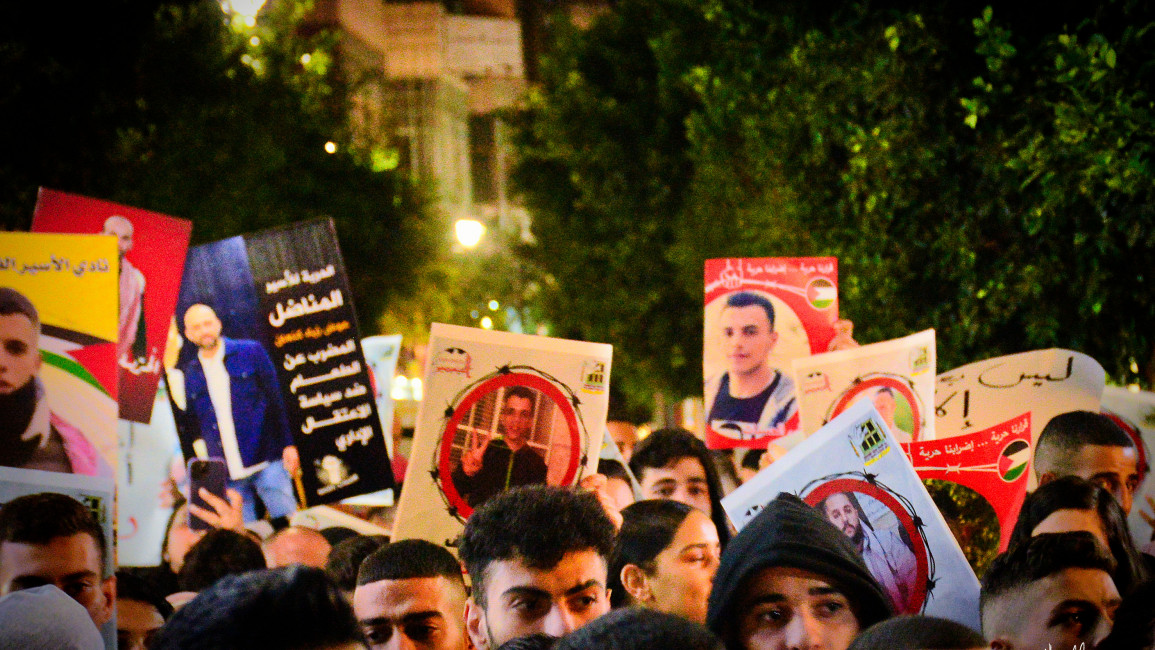'Slow execution': Palestinian detainees protest Israel's medical neglect of cancer-stricken prisoner
Palestinian prisoners staged protests in Israeli jails on Wednesday over the mistreatment of sick detainees, especially Palestinian writer Walid Daqqa, who suffers from cancer.
Detainees brought all Israeli prison activities to a halt by sealing-off the sections of their jails over the medical neglect of prisoners.
"The protest came against the occupation’s prevention of ill prisoners at the Ramleh prison clinic, especially Walid Daqqa, from communicating with their families, in addition to preventing them from certain types of food," a statement by the Palestinian Prisoners' Club read.
The Ramleh prison clinic is not suitable for the medical treatment and care necessary in
— Dean Thomas (@DeanTho59556730) June 10, 2023
critical cases, some Palestinian prisoners describing it as the “slaughterhouse” due to its high
number of casualties.#WalidDaqqa#FreeThemAll#IsraeliCrimes
The Ramleh prison clinic is a primary health facility run by the Israeli prison services, where 15 Palestinians - including Daqqa - are held under around-the-clock supervision. He, like other prisoners at the Ramleh, suffer serious health conditions and require specialised care.
"For several days, the occupation authorities have banned Walid Daqqa from using the phone to communicate with his family," Ayah Shreiteh, spokesperson for the Palestinian Prisoners Club, told The New Arab.
"The condition of Daqqa and other ill prisoners is already precarious at Ramleh, as prisoners can't access the proper health [care] that they need, which exposes them to further health deterioration," said Shreiteh. "This is part of the occupation's medical neglect policy, which prisoners are protesting too."
Sixty-two-year-old Walid Daqqa's condition has deteriorated significantly since March, following a lung infection, leading to his transfer to an Israeli civil hospital.
MUST READ: "Appeals from health experts, legal experts, and human rights organizations continue to be ignored by Israeli authorities and the IPS, despite the imminent threat to Daqqah’s life."
— Palestine Deep Dive (@PDeepdive) June 5, 2023
Article by @MariamBarghouti in @Mondoweiss https://t.co/15qVZZsAP1
Earlier in June, Israeli authorities transferred Daqqa to the Ramleh prison clinic. On Thursday, Daqqa’s wife, Sanaa Salameh, was able to visit him after a full month of waiting for a visit approval.
"Walid’s condition has slightly improved, but it remains generally very sensitive, as it can deteriorate at any moment," said Sanaa Salameh.
"What brought Walid to this stage is the occupation's medical neglect policy - a policy of slow execution against him."
Daqqa was arrested in 1986 and sentenced to 38 years in jail for membership to an armed Palestinian cell. During his prison time, Daqqa finished his higher studies, published several articles and books, and gained prominence as a writer.
On May 22, Daqqa was transferred to the intensive care unit at the Assaf Harofeh hospital south of Tel Aviv due to further health complications. later, Israeli authorities transferred him back to the Ramleh prison’s clinic in Israel,
— Rania (@RaniaAldemasi) June 10, 2023
He also married Sanaa Salameh, who gave birth to their daughter in 2020 through smuggled sperm. I the same year, Daqqa was sentenced to two additional years for helping in smuggling phones for Palestinian prisoners. He finished his 38-years sentence last March, and is serving his second two-year-sentence.
In early June, an Israeli court refused to grant Daqqa early release for humanitarian reasons based on his health condition, after a wide lobbying campaign against his release by the family of an Israeli soldier that Daqqa’s cell killed in 1986.
The campaign has received the public support of far-right Israeli politicians, including Israel’s National Security Minister Itamar Ben-Gvir.
Currently, 700 out of the almost 5,000 Palestinians in Israeli jails suffer from different diseases. Around 200 have chronic diseases, and 24 suffer from different kinds of cancer. Since 1967, some 73 ill Palestinians in Israeli jails have died due to medical neglect, according to Palestinian prisoners' support groups and human rights campaigners.



